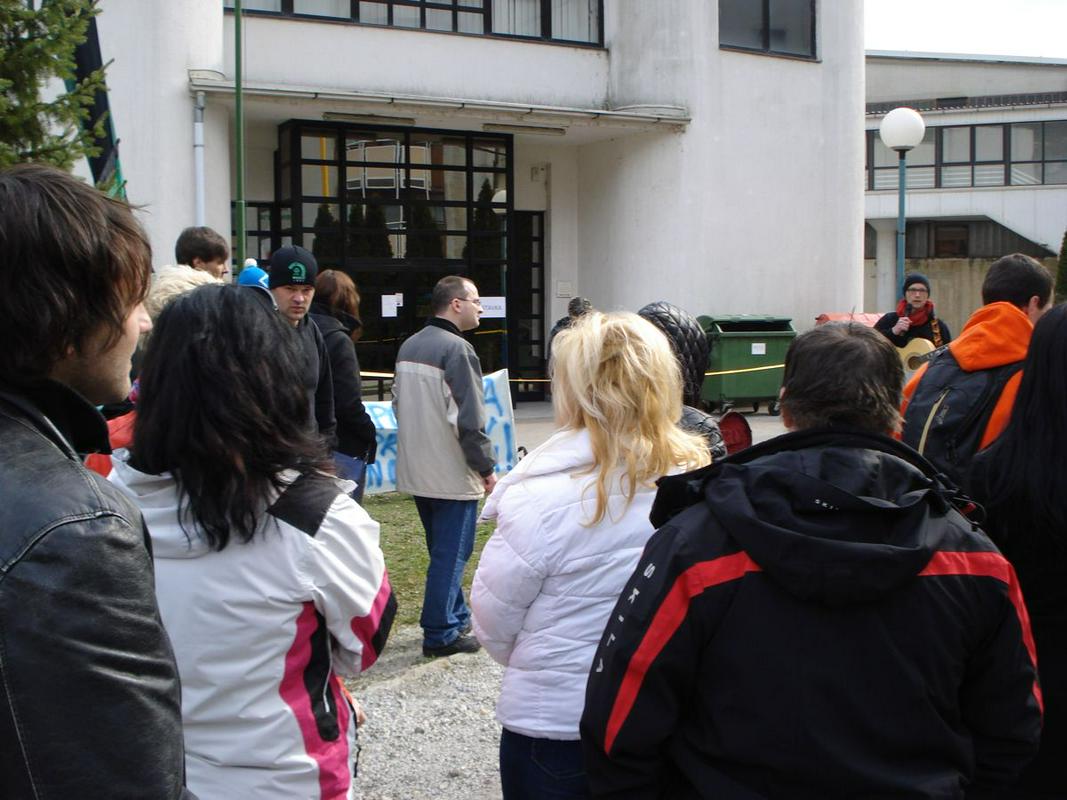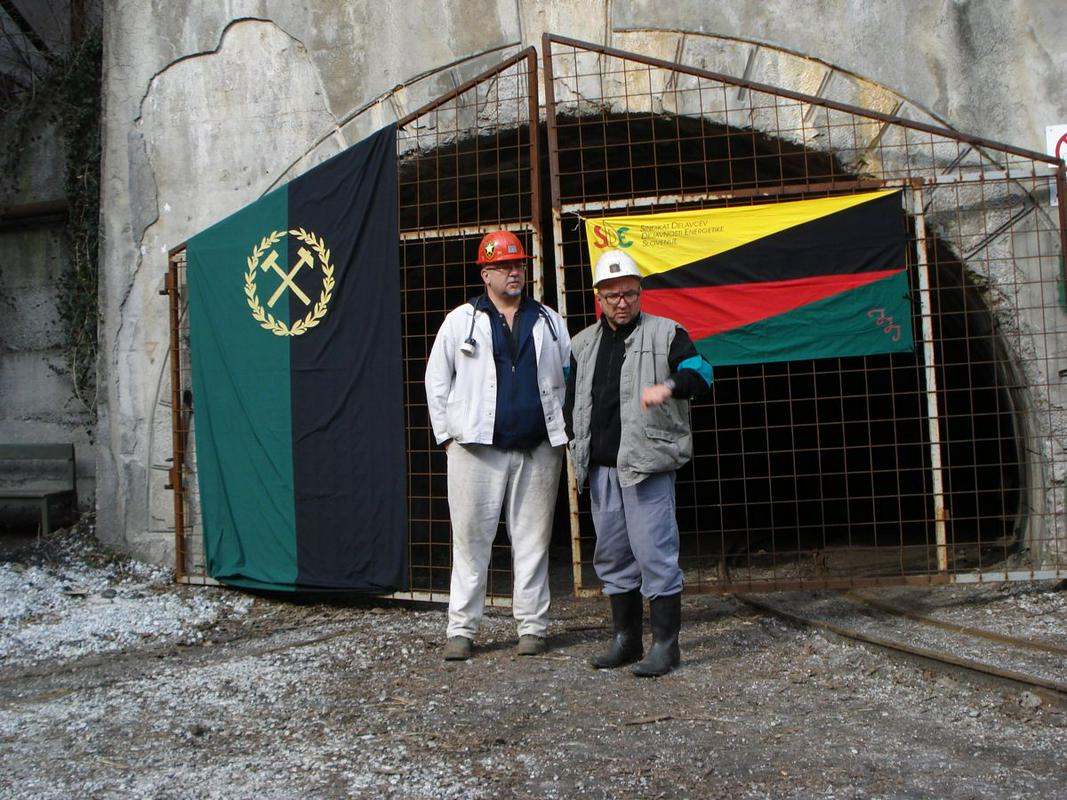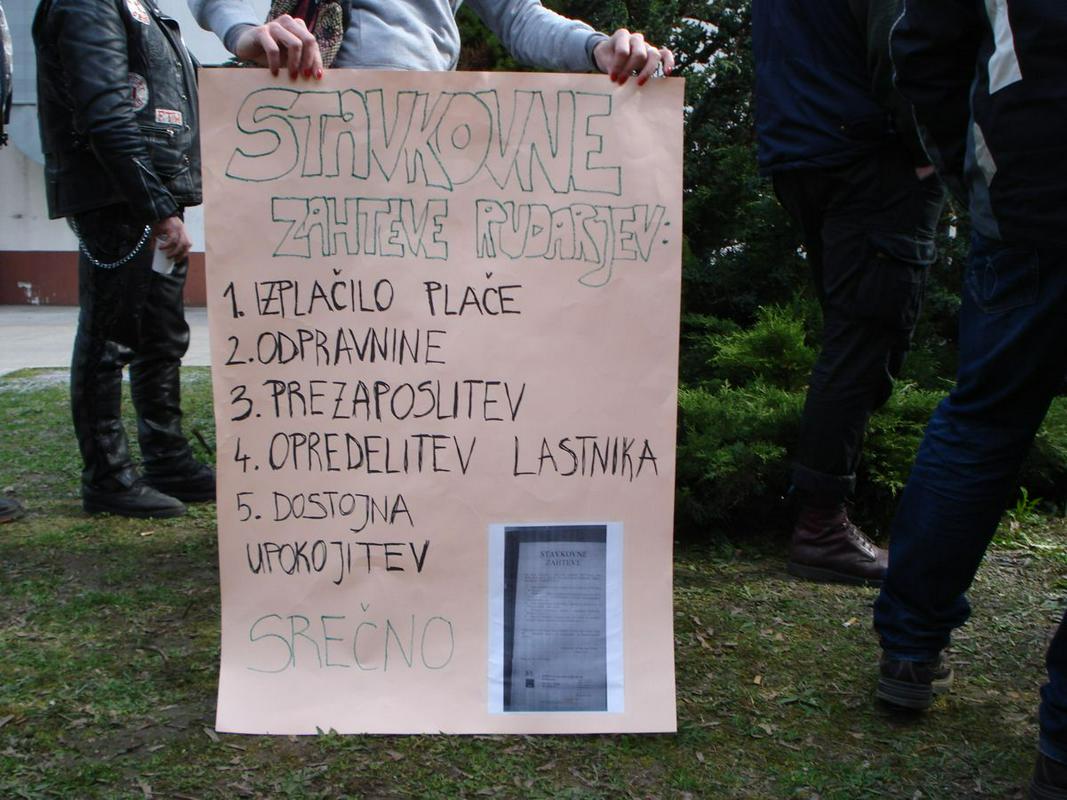


The minister should be happy they didn't drag him down in the hole with them," was the short but to-the-point comment of a retired miner, who came to show his solidarity with the miners in front of the Hrastnik mine building. Negotiations between the miners on strike and the Minister for Infrastructure and Spatial Planning, Samo Omerzel, went on during the night.
And what that person said wasn't far from the truth. We were convinced an hour later when miners started exiting the building after failed talks with the minster. With “good luck” cries from the crowd, miners started heading back into the mine. They are determined to stay there until all their demands are met. "We've got nothing to lose," tells me one of the miners, loading rucksacks with food, drinking water and first aid kits they might need while on strike, onto a truck.
Although preparing to spend another night under the surface in a damp pit with temperatures around 14 degrees, the miners have managed to keep their good spirits. "Ah, my wife's going to be happy if I'm not around for a few more days," is how one miner replied to his colleague, when asked whether his family would be worried. A young housewife following the event seemed to be more concerned: "It's nice that they manage to maintain their good spirits, considering the situation they're in."
"I send applications, but to no avail"
Despite their good spirits miners have more than one reason to be worried. The faith of the Trbovlje – Hrastnik RTH mine is sealed. The economic conditions in the Zasavje region, which flourished with the development of the power supply industry, are not promising. "I've been sending job applications everywhere for nine months now, but I've had no response. How are we older people going to find a job, when even the young can't find work," is what one of the miners tells me before going into the mine. He lacks two more years of service to be eligible for pension. He's not optimistic about the proposed reemployment program for miners: "Personally I only know three miners who managed to find jobs that way. Many times a company takes a miner just because of the subsidies, and then lets him go."
However the dire situation hasn't shaken the friendship that exists among miners. Backup miners and retired miners are showing their support for the strike. "Once you become a miner, it stays with you forever," explain the former miners. When asked whether it is hard work, most of them say "you get used to it". At the same time they also stress that many miners fail to enjoy a long well-deserved retirement. "A lot of my friends have passed away around the age of 55," explains one of the retirees. He can't say though whether their deaths were related to working in the mine or the air pollution in the Zasavje region.
The fatal loss of a job
Former colleagues weren't the only ones who came to show their solidarity. Other people also showed up, mostly local young people or so-called "miners' children". Around one hundred people gathered in front of the Hrastnik mine building, to show their support for the miners on strike, who "in the 21st century have to go down in a mine to get paid for their honest work".
Some followed their fathers with worried looks on their faces, as they left the surface with cries of "Good luck". A miner's profession involves many risks. Many accidents have happened in the past. "Quite a few colleagues and people I know have never come out," says one of the young supporters, a son of a retired miner.
His father worked in the mine a good thirty years. He then became jobless, only a few years before going into retirement. The sudden drop in living standards completely broke him down. He found comfort in alcohol. "Nothing could cheer him up, not even the birth of his grandson. He just couldn't come to terms with losing his job. Many times he questioned how his grandson would ever like him when he had nothing to give him". At the end alcohol fatally influenced his health. A younger friend of his also lost his miner father, who died because of cancer at the age of 45.
There's no future for miners, and no future for the young
"This is not only about the miners, but also about the future of the young people in Zasavje and other neglected regions in Slovenia," is how both of them explained their presence at the protest. Zasavje doesn't offer a lot of employment opportunities for the young. During the crisis social problems have only deepened. "Today many people come to you asking if they could borrow twenty euros, because somebody either still hasn't returned them the money, or still hasn't paid them for something." In those kind of social conditions, the idea of Minister Omerzel, that the RTH mine could collect funds by selling the apartments it owns to those living in them, sounds like a bad joke.
The young people of Zasavje are not hiding their anger. "The living conditions in this country are hopeless. You could find conditions like this in Balkans ten years ago. My father came to Slovenia right because of that, to escape those kind of conditions. As it turns out I might have to do the same and go elsewhere. Isn't that awful? To work honestly all your life, and to not be able to buy your children or grandchildren anything!?" angrily said a third young supporter of the miners.
Concern and tears
His friend, a son of a retired miner, has felt the harsh social reality of the Zasavje region on his own skin as well. "I worked in different inns, also for private companies, but I always ran into difficulties when it was time to get paid." After finishing high school he started studying economy, but had to quit studying in his second year due to financial problems. At the end he got employed at the Slovenian Army, after experiencing the inefficiency of the country's Employment Agency for several months.
While he was telling me all this, we were interrupted by a young girl who was sharing her story, shortly after waving her father on his way to the mine. Visibly shaken, she was telling the story of how her father came to Zasavje in order to learn to become a miner, and how proud he was of his profession. "In the past we were all proud of the mining profession," she exclaimed, "but today in some places it's even shameful to say you're a miner." After saying that last sentence, she could no longer hold back her tears.

































































